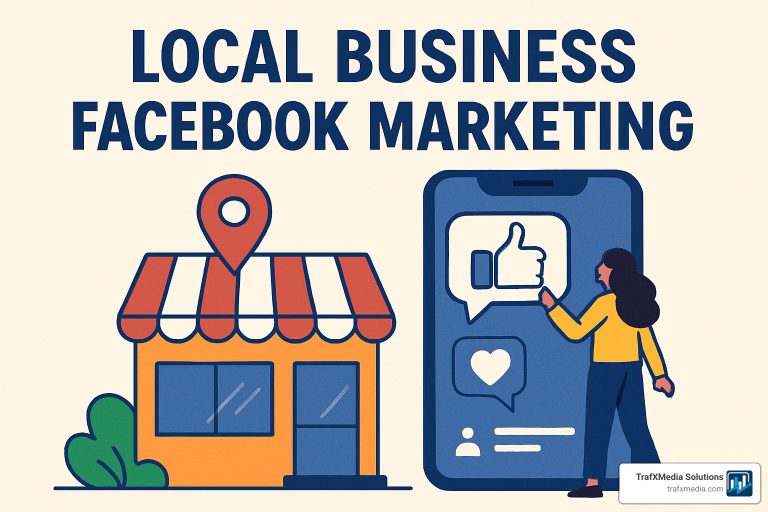Grow Your Practice: How Google Ads Can Work Wonders for Accountants
Introduction: Your Firm’s Path to Digital Growth
In today’s competitive landscape, accounting firms can no longer rely solely on referrals and traditional networking to drive growth. The modern client journey begins online, typically with a Google search. This digital shift presents a significant opportunity for firms ready to adapt. For accounting firms, Google ads for accountants offer a direct, powerful, and measurable path to connect with new clients and achieve sustainable growth. Effective management of these powerful campaigns involves more than just turning them on; it requires strategic setup, ongoing monitoring, continuous optimization, and clear performance tracking to maximize your return on investment (ROI).
Imagine getting your firm’s services in front of potential clients at the precise moment they are actively searching for a solution to their financial challenges. Unlike the slow burn of organic search engine optimization (SEO), which can take many months to yield results, Google Ads campaigns can be live in a matter of days, driving immediate, targeted traffic and qualified leads to your website. This speed and precision allow you to secure top placement in online searches, attracting high-quality prospects who are genuinely interested in your specific accounting services. By appearing at the top of the results, you not only capture high-intent traffic but also build credibility and differentiate your firm in a crowded digital marketplace.
I’m Richard Taylor, a business consultant with TrafXMedia Solutions. With years of experience in digital strategy and a deep understanding of the professional services industry, I help firms like yours steer the complexities of online advertising to achieve greater visibility and measurable growth in the competitive online landscape.
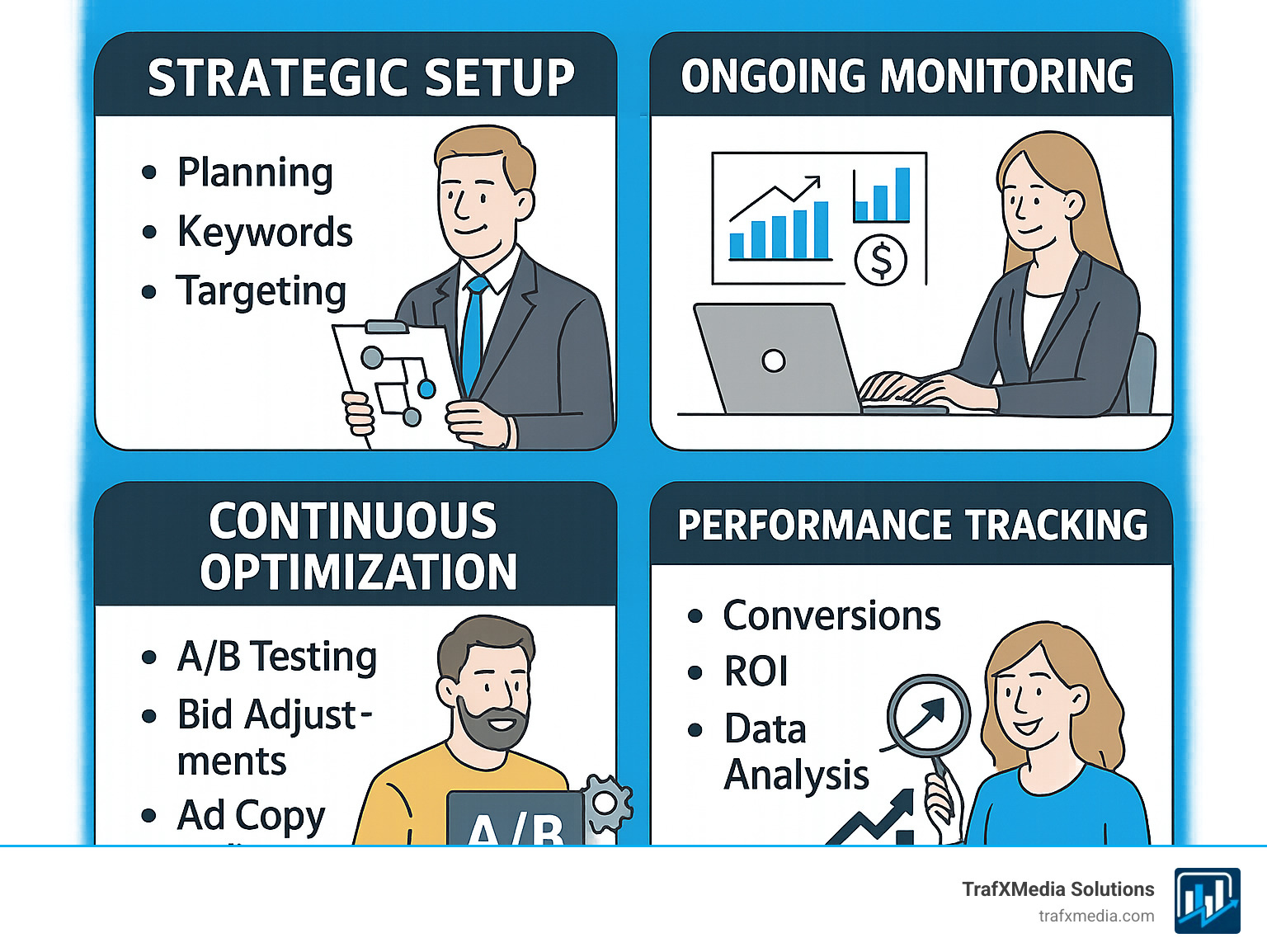
Quick Google ads for accountants definitions:
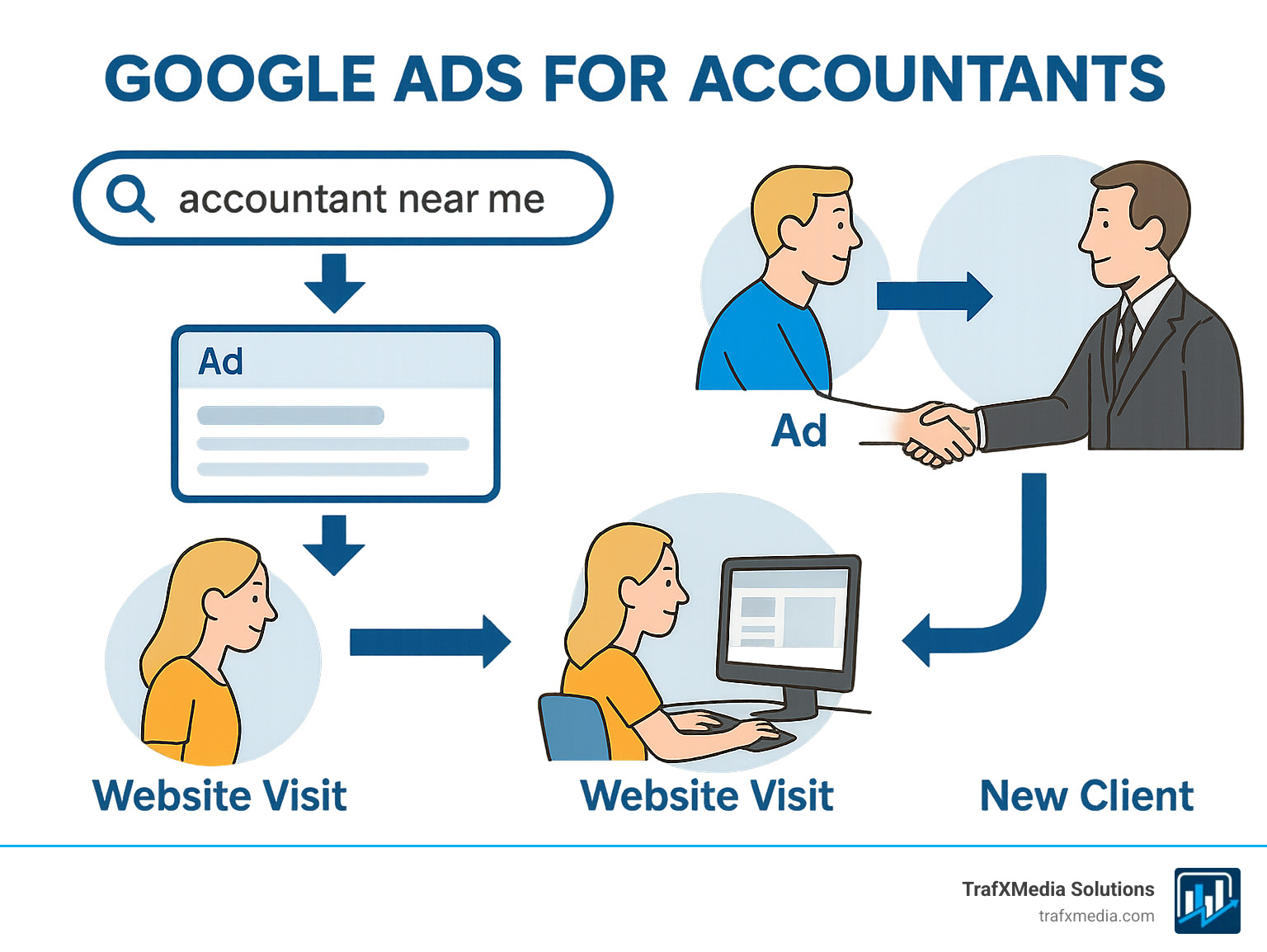
Understanding Google Ads: The Accountant’s Gateway to New Clients

Every day, thousands of potential clients—from individuals facing complex tax situations to businesses needing robust bookkeeping and audit support—actively search online for accounting services. They have urgent problems and represent genuine, high-value opportunities for your firm. Google ads for accountants are the fastest and most direct way to place your firm in front of these ready-to-hire prospects.
While organic SEO is a crucial long-term strategy for building authority, a Google Ads campaign can drive targeted traffic within days. Your ads appear prominently at the top of search results the moment someone searches for your services. You pay a fee only when they click your ad, but that click represents a person with a declared, immediate need. The benefits are compelling: a surge in relevant website traffic, a clearly measurable ROI, and the unparalleled ability to reach clients with high purchase intent. This precision targeting not only helps you differentiate from competitors but also builds instant credibility through top-of-page search placement.
At its core, Google Ads operates on an auction system. However, it’s not just about who bids the most. Google determines ad placement using a metric called Ad Rank, which is a calculation of your maximum bid multiplied by your Quality Score. Quality Score is Google’s rating of the quality and relevance of your keywords, ad copy, and landing page. This means a firm with a highly relevant ad and landing page can achieve a better ad position at a lower cost than a competitor with a higher bid but lower relevance. This system rewards advertisers who provide the best user experience, which aligns perfectly with an accounting firm’s goal of attracting the right clients.
Targeting the Right Clients for Your Accounting Firm
The true power of Google ads for accountants lies in its ability to attract your ideal clients. This process begins with a deep understanding of your target audience and the creation of detailed buyer personas. Are you targeting small business owners in the tech sector, high-net-worth individuals planning for retirement, or growing construction companies needing specialized audit services? Defining these personas will shape every aspect of your campaign, from keyword selection to ad copy.
Precision targeting options allow you to refine your audience with incredible detail:
- Geographic Targeting: Don’t waste your budget on clicks from outside your service area. Focus your ad spend on specific cities, counties, ZIP codes, or even a set radius around your office. This is essential for attracting local clients who value face-to-face consultations. You can also exclude locations to further refine your reach.
- Demographic Targeting: Layer on demographic data to reach specific age groups, genders, or household income levels. For example, you could target your ads for retirement planning services to users aged 55+ or ads for startup accounting packages to younger entrepreneurs.
- Service-Specific Targeting: This is where keyword strategy comes into play. Use precise, long-tail keywords like “tax planning for small businesses,” “forensic accounting services for legal disputes,” or “IRS audit representation in [Your City]” to attract clients who need your specific areas of expertise. This ensures your ads are shown to users with a clear and relevant need.
This layered targeting approach ensures your ad spend is laser-focused on prospects who are most likely to convert and align with your firm’s long-term growth goals.
The Power of Local: Why “Near Me” Searches Matter
For most accounting firms, the local market is the primary source of new business. Clients often prefer an accountant they can meet in person, making local searches like “accountant near me” or “CPA in [Your City]” incredibly valuable. These searchers have high commercial intent and are often ready to take immediate action. With 46% of all Google searches looking for local information, optimizing for local search is not optional—it’s essential.
Google Ads work in powerful synergy with your local SEO efforts. Your ads provide immediate, top-of-page visibility, while your organic presence builds long-term trust and authority. Your Google Business Profile (GBP) is the linchpin of this strategy. A complete and optimized GBP feeds your business name, address, phone number, hours, and client reviews directly into both paid and organic search results. When you run Google Ads with a location extension, your ad can appear in the local map pack, making your firm the most prominent and obvious choice for local clients seeking your services.
Building Your First High-Impact Google Ads Campaign
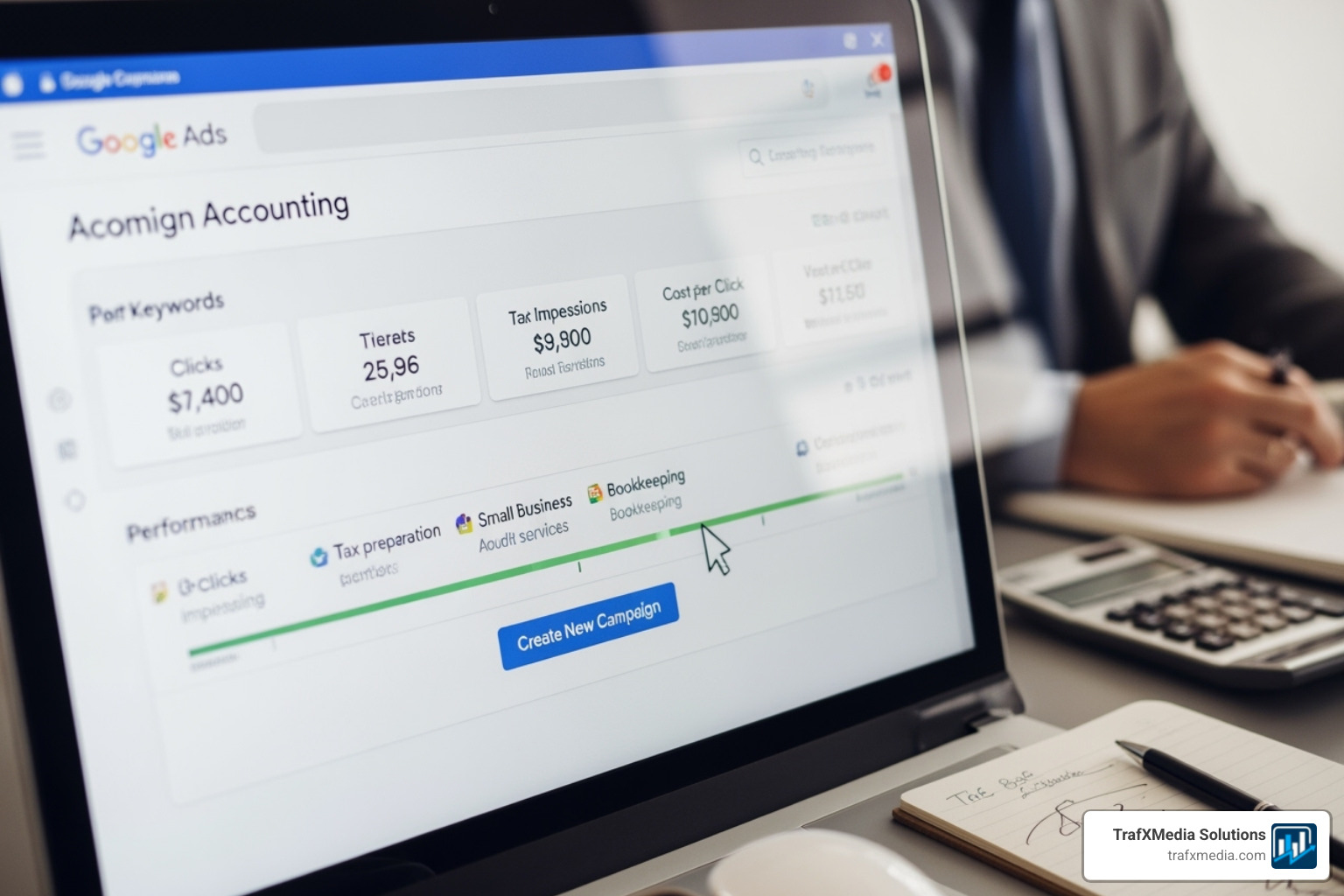
Building your first Google ads for accountants campaign requires a strategic and methodical approach. A solid foundation is critical for success and prevents wasted ad spend. We begin by designing a logical Campaign Structure. This involves creating separate campaigns for each of your primary service lines, such as “Tax Services,” “Bookkeeping,” or “Audit & Assurance.” This separation allows for dedicated budgets and custom strategies for each service. Within these campaigns, we create highly specific Ad Groups that target tight-knit keyword themes. For example, under the “Tax Services” campaign, you might have ad groups for “Personal Tax Preparation,” “Business Tax Filing,” and “IRS Problem Resolution.” This granular structure ensures your ads are always hyper-relevant to the user’s search query, which boosts your Quality Score and lowers your costs.
Strategic Budgeting and Bidding Strategies are the engine of your campaign’s performance. We help you set a clear daily or monthly budget based on your growth goals and market competitiveness. From there, we select the right bidding strategy to maximize your ROI. For new campaigns, we might start with Manual CPC or Improved CPC to gather data and maintain control. As the campaign matures and collects conversion data, we can transition to automated strategies like Maximize Conversions or Target CPA (Cost-Per-Acquisition), which use Google’s machine learning to bid for clicks most likely to result in a new client.
The client’s journey doesn’t end with a click; it begins. A dedicated Landing Page is arguably the most critical element of a successful campaign. This page must be highly relevant to both the ad copy and the original search query. We focus on Conversion-Focused Design, ensuring your landing pages have a clear, compelling headline, trust-building elements (like testimonials and certifications), and prominent Calls-to-Action (CTAs), such as “Schedule Your Free Consultation” or “Download Our Tax Prep Checklist.” The page must be easy to steer and mobile-friendly, making it simple for a visitor to take the next step and become a client.
Key Components of a Successful Google Ads for Accountants Campaign
A successful campaign is built from several essential, interconnected components. The foundation is meticulous Keyword Research. We go beyond obvious terms to uncover the exact phrases your ideal clients are typing into Google. This involves:
- Analyzing Intent: We differentiate between informational keywords (e.g., “how to file quarterly taxes”) and high-intent, transactional keywords (e.g., “hire accountant for small business”).
- Utilizing Match Types: We use a mix of Broad Match (for findy), Phrase Match (for control), and Exact Match (for precision) to control which searches trigger your ads.
- Identifying Negative Keywords: Just as important is identifying what you don’t want to show up for. We build extensive negative keyword lists (e.g., “accounting software,” “accountant salary,” “free tax help”) to eliminate irrelevant clicks and protect your budget.
Compelling Ad Copy is your firm’s digital first impression. We craft headlines and descriptions that resonate with client pain points, highlight your unique value proposition, and create a sense of urgency. Every ad must feature a Strong Call-to-Action (CTA) that tells the user exactly what to do next, such as “Call Now for a Free Quote” or “Book Your Consultation Online.”
Ad Extensions are powerful tools that expand your ad’s size and provide additional information, giving searchers more reasons to choose your firm. Essential extensions for accountants include:
- Sitelink Extensions: Direct users to specific, relevant pages on your site, like “Tax Services,” “Bookkeeping Solutions,” or “About Our Firm.”
- Callout Extensions: Highlight key benefits and features in short snippets, such as “Certified Public Accountants,” “25+ Years of Experience,” or “Serving the Bay Area.”
- Structured Snippet Extensions: Showcase a list of your services under a predefined header (e.g., Services: Tax Preparation, Payroll, Financial Consulting).
- Location Extensions: Display your address, phone number, and a map marker, making it easy for local clients to find you.
- Call Extensions: Add your phone number directly to the ad, allowing mobile users to call you with a single tap.
- Image Extensions: Add visual appeal to your text ads with relevant, professional images of your team or office.
- Lead Form Extensions: Allow users to submit their contact information directly from the ad itself, reducing friction and capturing leads seamlessly.
Writing Ad Copy That Converts
Your ad copy is the bridge between a potential client’s problem and your firm’s solution. To be effective, it must connect, persuade, and convert. We focus on several key principles:
- Addressing Client Pain Points: Speak directly to the user’s stress or confusion. Use language like “Stressed About Tax Season?” or “Is Your Bookkeeping a Mess?” to show you understand their problem.
- Highlighting Unique Selling Propositions (USPs): What makes your firm the best choice? Is it your specialization in a particular industry, your fixed-fee pricing, or your commitment to personalized service? We weave these differentiators into your ad copy.
- Using Action-Oriented Language: Employ strong verbs that prompt the next step. Words like “Get,” “Solve,” “Secure,” “Schedule,” and “Find” encourage immediate action.
- A/B Testing Headlines and Descriptions: We never assume we know what works best. We continuously run A/B tests, pitting different headlines, descriptions, and CTAs against each other to identify the highest-performing combinations. The goal is to Generate as many relevant variations as possible to allow Google’s system to optimize for the best results.
- Building Trust and Authority: Your copy must convey professionalism and reliability. Mentioning credentials (“CPA-Led Firm”), years of experience, or awards can significantly increase a user’s confidence and encourage them to click.
Mastering Campaign Management and Optimization
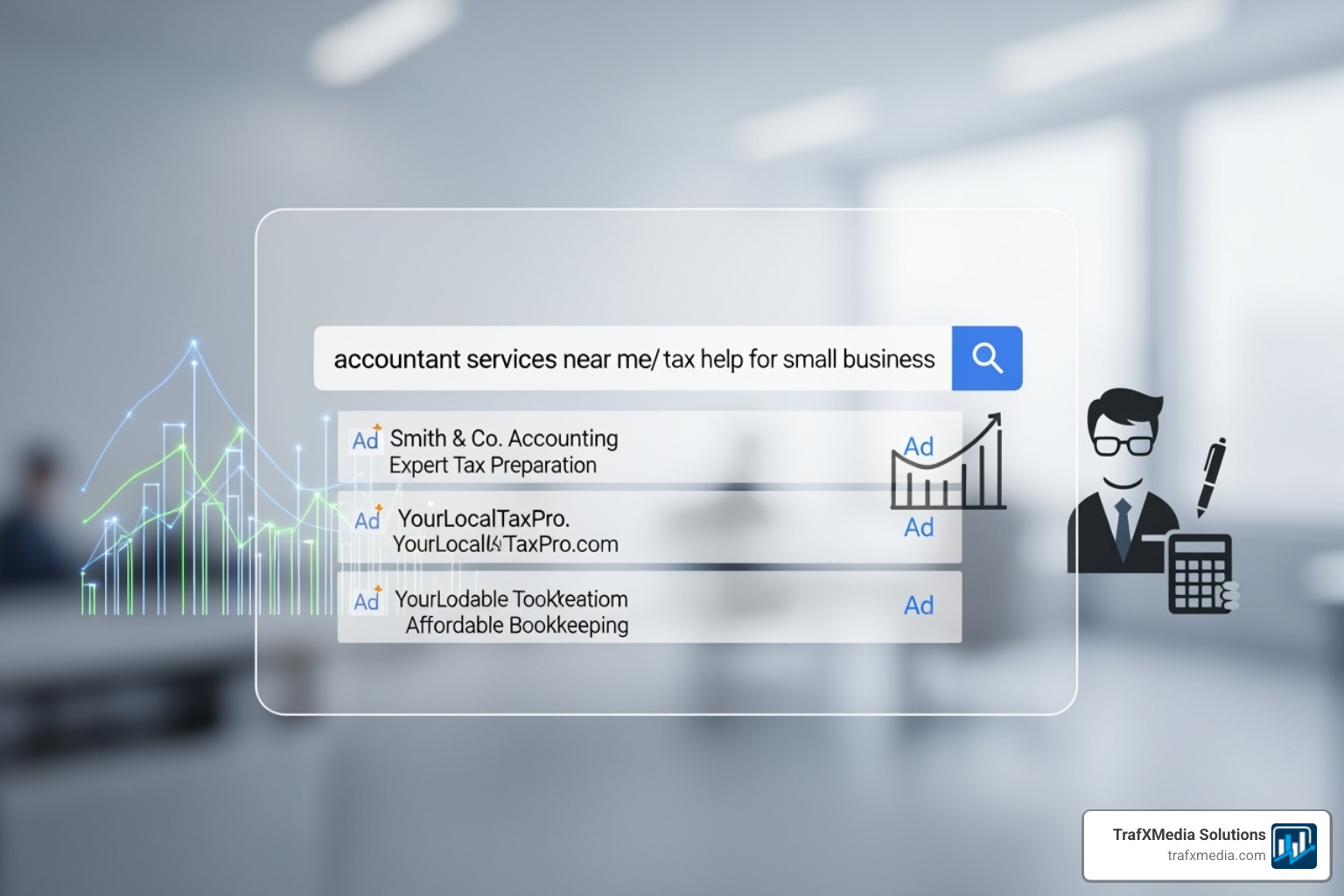
Launching a Google ads for accountants campaign is just the beginning; ongoing, active management and optimization are where success is truly forged. This is not a “set it and forget it” marketing channel. It requires consistent, thoughtful analysis and adjustment to ensure your investment continues to yield a positive return. Without it, performance can quickly degrade, and budgets can be wasted.
We constantly monitor campaign performance, paying close attention to your Quality Score. This crucial Google rating (from 1 to 10) evaluates the overall relevance and quality of your advertising. It’s determined by three main factors: Expected Click-Through Rate (CTR), Ad Relevance, and Landing Page Experience. A higher Quality Score is rewarded by Google with lower advertising costs and better ad positions. Managing a campaign effectively requires a significant time commitment and deep platform expertise, which can be a major challenge for busy accounting professionals. The platform is complex and competitive, and without specialized knowledge, it’s easy to make costly mistakes. That’s why we employ a rigorous, data-driven approach, using real performance insights—not guesswork—to guide every strategic decision.
Measuring Success: Tracking and Analytics for Accountants
If you can’t measure it, you can’t improve it. Effective measurement starts with a flawless conversion tracking setup. We implement tracking codes on your website to monitor every valuable action a potential client can take. This includes contact form submissions (by tracking visits to the ‘thank you’ page), phone calls from your website (using dynamic number insertion), and direct calls from your ads (via call extensions). This allows us to measure the metrics that truly matter to your firm’s bottom line.
Key performance indicators (KPIs) we track include:
- Impressions: The number of times your ad was shown.
- Click-Through Rate (CTR): The percentage of impressions that resulted in a click. This is a primary indicator of your ad’s relevance and appeal.
- Cost-Per-Click (CPC): The average amount you pay for each click.
- Conversion Rate: The percentage of clicks that result in a valuable action (a lead). This measures the effectiveness of your landing page and offer.
- Cost-Per-Acquisition (CPA): The total cost to acquire one new lead. This is a critical metric for evaluating profitability.
- Impression Share: The percentage of times your ads were shown out of the total number of times they could have been shown. This helps gauge your visibility against competitors.
By integrating your Google Ads account with Google Analytics, we gain a much richer picture of user behavior after the click. We can see how long visitors stay on your site, which pages they visit, and how they steer your client acquisition funnel. This data is then translated into clear, actionable insights that help us refine your strategy and grow your practice.
How to Optimize Your Google Ads for Accountants Campaigns
Optimization is the continuous process of making strategic, data-backed adjustments to improve your campaign’s ROI. It’s a cycle of testing, learning, and refining. Our comprehensive optimization approach includes:
- A/B Testing: We constantly test variations of ad headlines, descriptions, calls-to-action, and even landing page designs to identify what resonates most with your target audience and drives the most conversions.
- Bid Adjustments: We don’t let bids run on autopilot. We analyze performance data to make strategic bid adjustments based on device (mobile vs. desktop), geographic location, time of day, and audience demographics, allocating more budget to what performs best.
- Keyword Refinement: We carefully review the Search Terms Report on a weekly basis. This report shows the exact queries people typed before clicking your ad. We use it to find new, high-performing keywords to add to your campaigns and to identify irrelevant search terms to add to your negative keyword list, preventing future wasted spend.
- Pausing Underperformers: We are ruthless in our pursuit of efficiency. Ads, keywords, or even entire ad groups that consistently fail to deliver a positive ROI are paused. This frees up the budget to be reallocated to proven winners.
- Landing Page Optimization: A click is worthless without a conversion. We analyze user behavior on your landing pages to identify and fix points of friction. This can involve improving page load speed, clarifying the headline, simplifying the contact form, or making the CTA more prominent.
- Reviewing Recommendations: We critically analyze Google’s automated suggestions in the “Recommendations” tab. While some can be helpful, others may not align with your specific business goals. We use our expertise to implement the suggestions that will genuinely improve performance.
Advanced Strategies: Local Services Ads and Retargeting
Once you’ve mastered the fundamentals of Google ads for accountants, it’s time to layer in advanced strategies to expand your reach, maximize efficiency, and re-engage valuable prospects. Google Local Services Ads (LSAs), retargeting campaigns, and Performance Max are powerful tools that can take your client acquisition efforts to the next level.
Here’s a quick comparison of traditional Google Ads and Local Services Ads:
| Feature | Traditional Google Ads (PPC) | Local Services Ads (LSAs) |
|---|---|---|
| Payment Model | Pay-per-click (PPC) – you pay every time someone clicks your ad, regardless of what they do next. | Pay-per-lead (PPL) – you only pay when a qualified potential client contacts you directly via call or message. |
| Ad Placement | Appears below LSAs, or alongside organic search results; can be text, display, or video formats. | Appears at the very top of search results, above all other paid and organic listings. |
| Targeting | Broad, granular control over keywords, demographics, locations, interests, and devices. | Automated keyword selection based on your selected services and geographic area. Simpler, less control. |
| Trust Signals | Relies on strong ad copy, landing page credibility, and your firm’s overall website reputation. | Features the prominent Google Screened badge, which requires background and license verification. |
A Closer Look at Google Local Services Ads (LSAs)
Google Local Services Ads (LSAs) are a game-changer for service-based local firms, including accountants and CPAs. They are designed for maximum trust and lead generation. Appearing at the very top of the search results, LSAs operate on a pay-per-lead model, which means you only pay when a potential client initiates contact by calling or messaging you directly through the ad. This model ties your marketing spend directly to tangible business inquiries.
One of the most powerful features is the Google Screened badge. To earn this badge, your firm and its professionals must pass background and license checks conducted by Google. This badge acts as a powerful, third-party endorsement, telling potential clients that Google has vetted your business. This builds immediate trust and confidence, setting you apart from competitors. For firms focused on attracting local clients for core services like tax prep or bookkeeping, LSAs offer unparalleled visibility and a stream of highly qualified, high-intent leads. You can even dispute invalid leads (e.g., spam calls, solicitations) directly within the LSA dashboard to request a credit. To learn more, see Google’s guide on Getting started with Local Services Ads.
The Art of Retargeting for Accounting Firms
Retargeting (or remarketing) is a highly effective strategy for any firm using Google ads for accountants. It’s based on a simple fact: the vast majority of first-time website visitors do not convert. When someone visits your website but leaves without contacting you, retargeting allows you to show them your display ads as they browse other websites and apps across the Google Display Network. It’s a strategic and gentle reminder that your firm is available to help.
An effective retargeting strategy involves segmenting your audience. For example, you can create separate audience lists for:
- All website visitors in the last 30 days.
- Visitors who viewed your “Business Tax Services” page.
- Visitors who started filling out your contact form but didn’t complete it (cart abandonment).
By creating custom ads for each segment, you can deliver a much more relevant message. Retargeting helps you:
- Stay Top-of-Mind: Keep your brand visible to prospects while they are still in the consideration phase.
- Nurture Warm Leads: Re-engage individuals who have already shown a clear interest in your services.
- Increase Conversion Rates: Bring interested prospects back to your site to complete a contact form or schedule a consultation.
- Build Brand Recall: Strengthen brand recognition and reinforce your firm’s expertise and authority.
Retargeting is a cost-effective way to maximize the value of your initial ad spend by converting prospects already familiar with your brand, making it an invaluable tool in your marketing arsenal.
Leveraging Performance Max (PMax) Campaigns
Performance Max (PMax) is Google’s newest goal-based campaign type that uses machine learning to help you find more converting customers across all of Google’s channels—YouTube, Display, Search, Find, Gmail, and Maps—from a single campaign. You provide the inputs: your conversion goals, budget, and creative assets (text, images, videos, logos). Google’s AI then automates targeting and bidding to drive the best possible results.
For accounting firms, PMax can be a powerful tool for expanding reach beyond traditional search campaigns. It can help you find new client segments you might not have considered and is particularly effective when you have clear conversion goals, like form submissions or phone calls. While it offers less manual control than standard search campaigns, its ability to tap into Google’s entire advertising ecosystem makes it a compelling option for firms looking to scale their lead generation efforts aggressively.
Frequently Asked Questions about Google Ads for Accountants
Here are answers to some of the most common questions we receive from accounting firms about navigating Google Ads.
How quickly can I see results from a Google Ads campaign?
One of the most significant advantages of Google ads for accountants is the speed at which you can see results. Unlike organic SEO, which can take months or even a year to build momentum, a well-planned and properly executed PPC campaign can start delivering targeted traffic and qualified leads within hours of its launch. Typically, a new campaign can be researched, built, and running in just a few days, providing your firm with rapid visibility at the top of Google’s search results for your most important services.
Is it better to use traditional Google Ads or Local Services Ads?
The best choice depends entirely on your firm’s specific goals and target market. It’s often not an “either/or” question, as many firms find success using both in tandem.
- Local Services Ads (LSAs) are excellent for generating a steady stream of high-intent local leads for your core, easily defined services (e.g., tax preparation, bookkeeping). The pay-per-lead model is low-risk, and the Google Screened badge provides an immediate trust signal that is hard to beat for local searchers.
- Traditional Google Ads offer far more granular control, flexibility, and reach. They are better for promoting niche or specialized services (e.g., “international tax planning for expats,” “forensic accounting”), targeting clients outside your immediate local area, building broader brand awareness, and executing sophisticated strategies like retargeting.
A common and effective strategy is to use LSAs to capture high-intent local leads while using traditional search and display campaigns for more strategic, brand-building, and niche-targeting goals.
Can I manage Google Ads myself or should I hire a professional?
While you can certainly manage a Google Ads account yourself, it’s crucial to understand the commitment required. The platform is complex, highly competitive, and constantly evolving. Without dedicated time and expertise, it’s very easy to make common mistakes that lead to a wasted budget on irrelevant clicks and poor-quality leads. Managing a campaign effectively requires in-depth keyword research, compelling ad copywriting, strategic bidding, constant monitoring, and data analysis—tasks that can consume many hours each week.
Hiring a professional or a specialized agency brings deep expertise to the table. An expert can conduct thorough market and keyword research, write ad copy designed to convert, implement advanced bidding strategies, and continuously optimize your campaigns for a better return on investment. While there is a management cost, a skilled professional can often make your ad budget work much more efficiently, ultimately saving you money, freeing up your valuable time, and generating a higher volume of quality leads for your firm.
How much should an accounting firm budget for Google Ads?
There is no one-size-fits-all answer, as the ideal budget depends on several factors: your geographic location (costs are higher in major metro areas), the competitiveness of your services, and your firm’s growth goals. A small firm in a rural area might see results with $500-$1,000 per month, while a firm in a competitive city like San Francisco or New York might need to invest $3,000-$5,000 or more per month to be competitive. The best approach is to determine your client acquisition goals and work backward. Start with a test budget for 2-3 months to gather data on cost-per-click (CPC) and cost-per-lead (CPL). This data will allow you to make an informed decision about scaling your investment for a predictable return.
What is a good Cost-Per-Lead (CPL) for an accountant?
A “good” CPL is relative and depends entirely on the lifetime value (LTV) of a new client to your firm. For example, if a typical business bookkeeping client generates $5,000 in revenue per year and stays with you for an average of four years, their LTV is $20,000. In this scenario, paying a CPL of $200, $300, or even $500 could be highly profitable. Conversely, if you’re advertising a one-time personal tax return service for $400, your target CPL would need to be much lower. The first step is to calculate the average LTV for each type of client you’re targeting. Once you know that, you can establish a target CPL that ensures strong profitability and a healthy return on ad spend (ROAS).
Will Google Ads take away traffic from my organic search results?
This is a common concern known as “organic cannibalization.” However, multiple studies, including those from Google itself, have shown that this fear is largely unfounded. In reality, running paid search ads alongside strong organic rankings has been shown to result in a higher total number of clicks. When your firm appears in both the paid and organic sections of the results page, it dominates more screen real-estate, reinforces your brand’s authority, and captures users who may preferentially click on ads over organic listings (and vice-versa). The two channels work synergistically, not against each other, to maximize your firm’s overall visibility and traffic from search.
Conclusion: Take Control of Your Firm’s Growth

Now is the time to move from passive hope to active strategy in how your firm grows. We’ve explored the comprehensive framework for leveraging Google ads for accountants as a powerful engine for client acquisition. Instead of waiting for referrals or the slow progress of organic search, you can take direct control, achieving increased visibility, generating a predictable stream of high-quality leads, and realizing an immediate, measurable return on your investment.
The path to success is clear. It begins with a solid foundation: a logical campaign structure, meticulous keyword research, and compelling ad copy. It thrives on continuous, data-driven optimization, where every click and conversion informs the next strategic move. By layering in advanced strategies like Local Services Ads for high-trust local leads and retargeting to nurture warm prospects, you build a resilient, multi-faceted system for client acquisition that gives you a distinct competitive edge.
This data-driven approach empowers you to make smarter, more confident business decisions and scale your firm effectively and predictably. At TrafXMedia Solutions, we don’t believe in one-size-fits-all solutions. We create personalized strategies that align with your firm’s unique services, target market, and growth objectives. We partner with you to ensure your digital marketing investment drives real, tangible growth. The clients you want are searching online for your expertise right now. The only question is: will they find you, or your competition?
Get a personalized Google Ads strategy for your San Francisco firm and take the first, decisive step toward changing how your firm grows.


